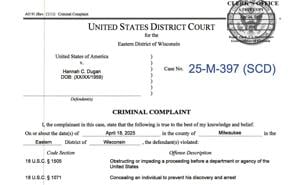(The Center Square) – The plan from a couple of Wisconsin’s progressive lawmakers to block ICE efforts in the state is drawing sharp, quick criticism.
Rep. Clint Moses, R-Menomonie, blasted the “Keep Families Together” package.
“The so-called ‘Keep Families Together’ package would funnel taxpayer dollars into immigration defense, block state, county, and city facilities from detaining individuals based on immigration,” Moses said in a statement.
Rep. Ryan Clancy, D-Milwaukee, and other members of The Wisconsin Legislative Socialist Caucus introduced a handful of pieces of legislation they say would address “the fear and chaos stoked by Immigration and Customs Enforcement.”
“President Trump is commanding ICE to detain and deport people to fill his arbitrary quotas, almost always without a judge’s oversight, often while agents are masked and unidentified,” Clancy said. “This is textbook authoritarianism. Fascists always attack marginalized communities first, but they won’t stop there. Ultimately, attacks on our undocumented neighbors undermine everyone’s safety.”
The Socialist Caucus’ legislation would:
● Fund immigration defense work
● Prevent government actors from acting while masked and unidentified
● Prohibit the use of state, county or city facilities for detaining people based solely on their immigration status
● Ban agreements appropriating local government resources for immigration enforcement
“This is nothing more than a blueprint for turning Wisconsin into a sanctuary state at the expense of hardworking Wisconsinites,” Moses said. “I will not stand for legislation that shifts costs onto our communities or puts Wisconsinites in danger.”
















